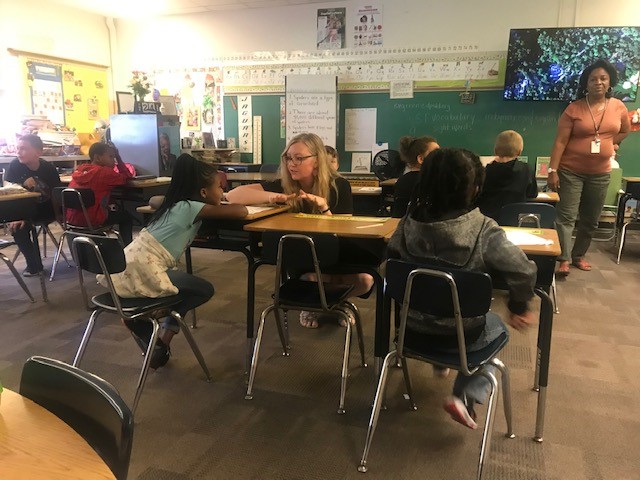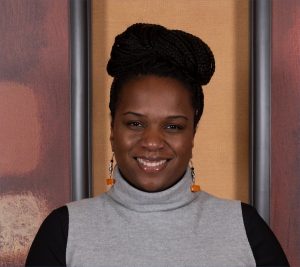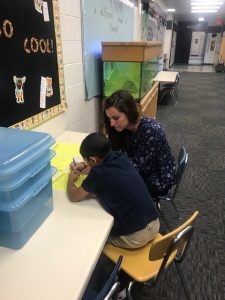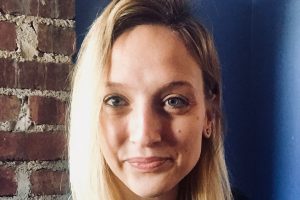Equity and Diversity Cohort gives Redbird teaching candidates experience in urban settings.
Illinois State student teaching candidate Kathryn McCormick was looking out to a diverse set of students coming from all different backgrounds while leading a small group lesson at Franklin Elementary School in Decatur. The activity required highlighters. Or so she thought. When McCormick, an aspiring teacher from Aurora, asked her students to take out their highlighters, she was met with blank stares. She quickly realized none of them had any.
That’s the reality in some urban school districts. They can lack the resources of their suburban or rural counterparts. McCormick had to adjust accordingly. In doing this, however, she saw the students’ enthusiasm to learn. By being present in an urban setting, she realized there was a misconception about students attending these districts.
“Going in, I think a lot of us had the perception that because they come from a low-income and Title IX school that they didn’t care or didn’t want to be there,” McCormick said. “That was the most eye-opening thing to me is that every student I worked with wanted to learn and wanted to be there.”
While always envisioning teaching in a suburban school district similar to the one she attended, McCormick sought to expand her skillset by immersing herself into a new community with a variety of demographics. Since the fall of 2018, College of Education and School of Teaching and Learning Assistant Professors Dr. Shamaine Bertrand and Dr. Erin Quast partnered with Decatur Public Schools. They co-created the Equity and Diversity Cohort to give students an opportunity to do just that with respect to social justice, equity, and restorative practice.
In their first years as faculty, Bertrand and Quast noted how they needed to focus teaching candidates’ “re-introduction” to elementary education on issues of equity and diversity. They identified a need for qualified teachers in urban districts across Illinois that serve students of color and students from low-income backgrounds. In coordination with National Center of Urban Education, they began searching for possible settings for the Equity and Diversity Cohort.
Bertrand was driving through Decatur and was struck by the number of minority children on playgrounds in addition to the clear lack of wealth compared to other parts of Illinois. According to census.gov, 30 percent of Decatur’s population is not white, and nearly 22 percent of the population lives below the poverty line.
After an initial visit, Quast accompanied Bertrand on a trip to Decatur to create a partnership with the schools. They eventually did with Franklin Elementary and Dennis Lab School. Initial reception at Illinois State was strong, too. The initial cohort consisted of 30 teaching candidates.
Based on the first meetings with the prospective teaching candidates, Bertrand and Quast knew this could be a strong experience for future Redbird educators.
“For many of the students, this was the first time holding conversations that asked them to be critical of their own experiences and worldviews,” Quast said. “It asked them to recognize the limitations of their knowledge and how they have participated in inequitable systems.”
More than 60 total students have been through the cohort in the first two falls of its existence.
Bertrand and Quast have made sure the prospective teachers lay the necessary groundwork so both they and the children in the classroom can mutually benefit. Prior to the program, the Illinois State assistant professors take their students by bus down to Decatur and tour the schools while stressing the importance of building relationships outside the classrooms. One of the common misperceptions, Bertrand said, is that parents in urban school districts aren’t as invested in their children’s education. But as Bertrand pointed out, some of those parents might be taking a second or third job and working at off hours to provide financially. In order to truly relate to a child in any setting, teaching candidates must have an awareness of individual situations.
“We don’t want our students to be naïve,” Bertrand said. “We want to let them know that a lot of this really is heart and mind on your behalf. You really have to go in with a mindset that you want to a make difference, and in order to do that, you are going to have to know the students that you teach.”
Redbird teaching candidate Danielle Thieman, who taught at Dennis Lab School last fall, took that to heart.
Describing herself as coming from an upper middle-class area with a predominantly white population, Thieman said she never realized there was a large issue with inequity in education because it did not affect her. In Decatur, she felt it was important to build personal relationships with her students so they felt more comfortable asking her for help and sharing their personal stories. She played with students at recess instead of standing with fellow teachers, and she also made a point to attend extracurricular events such as plays, music performances, and sporting events. This translated to being able to connect with children of all backgrounds in the classroom.
“First and foremost, we must realize that diverse students do not need to be saved, rather, they need to be given the individualized tools to succeed,” Thieman said. “The greatest lesson I learned in this cohort is equity is not the same as equality, and educators must strive to make their classroom equitable across all levels.”
This cohort has now expanded locally. College of Education Hall of Fame inductee Dr. Diane Wolf ’89, ’92, ME ’94, Ed.D. ’15, the assistant superintendent of District 87 schools in Bloomington, saw an opportunity for students to gain this experience closer to the Illinois State campus.
The structure, according to Wolf, is that Redbird teaching candidates will be placed in an elementary school and conduct their Illinois State classes at a District 87 school. Then, they will partner with teachers, many being Illinois State alums themselves, for their practicum experiences.
“As we prepare students for a world that embraces diversity and demands equity, we know that one way to do this is for our ISU student colleagues to be exposed to students from different backgrounds than their own,” Wolf said. “District 87 is proud to be a diverse district and embraces this diversity of races, socio-economics, beliefs, and income as a way for us to celebrate that every child brings a wonderful story into our schools.”
Also in Bloomington-Normal, some of the teaching candidates who spent time in Decatur transitioned to Unit 5 for their professional development school student teaching experience, where Bertrand serves as site coordinator.
No matter where candidates end up from the Equity and Diversity Cohort, the versatility they learn in how to reach all students has an immeasurable effect.
“Decatur has taught me what it means to be a culturally responsive educator, and I’ve learned that not only is it imperative that I teach that way but to also encourage my future colleagues to do the same,” said Illinois State teaching candidate Emma White, who taught at Franklin Elementary School in Decatur and is now at Unit 5’s Cedar Ridge Elementary School. “It’s not enough to be ‘color-blind’ or have a ‘onesize-fits-all’ motto, because that is not what the students of diverse backgrounds need in order to succeed.”
It’s especially important as the country itself has become more and more diverse. By the time candidates enter classrooms, that representation will be more present in suburban, urban, or even rural settings. According to a new Pew Research Center analysis of census data, 109 counties in 22 states have gone from majority white to majority nonwhite since 2000.
With the implementation of the Equity and Diversity Cohort, Illinois State teaching candidates are given the opportunity to experience the evolving demographics before they ever become full-time.




